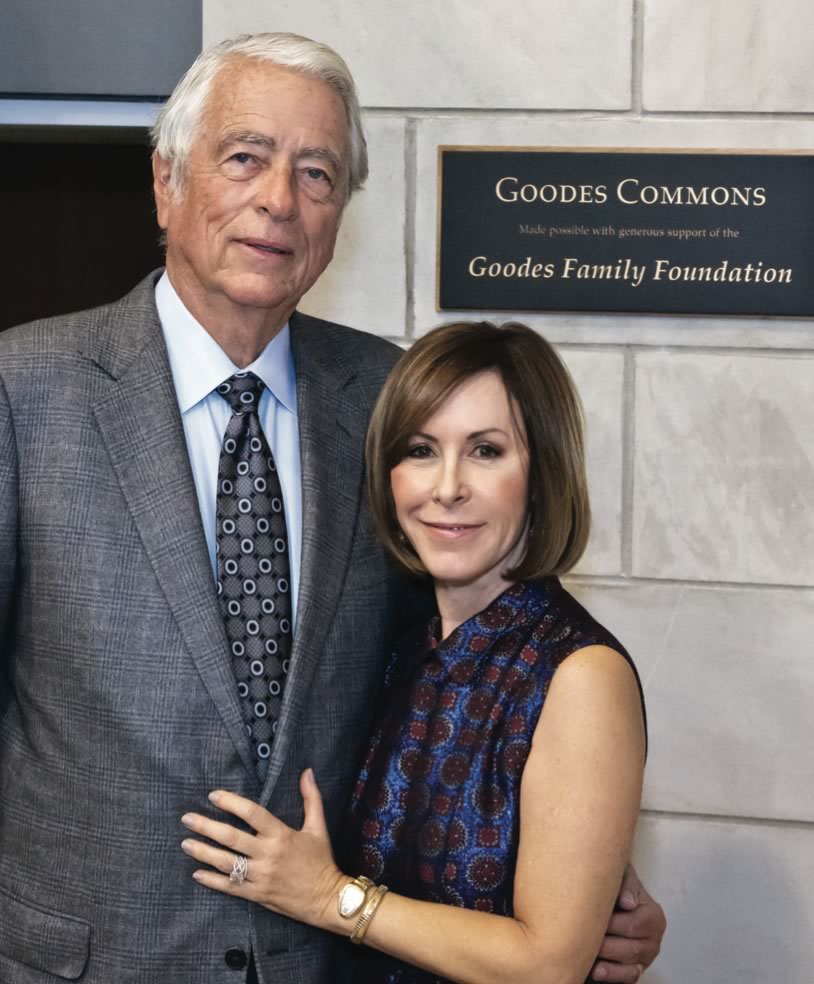The Unforgettable Mel Goodes

The name of the business school itself has changed, but its home proudly remains, and will always be known as, Goodes Hall. At its unveiling in 2002, the building was named in honour of benefactor Mel Goodes, BCom’57, LLD’98. His generosity is felt daily by the many students who gather in the Goodes Commons, the airy and welcoming centrepiece of the west wing addition that opened in 2012.
Just two years previously, Mel had gone public with the news that he’d been diagnosed with Alzheimer’s disease. As the illness progressed, he and his family decided to take action. The Goodes Family Foundation made a commitment of $750,000 to fund the Melvin R. Goodes Prize for Excellence in Alzheimer’s Drug Discovery for 10 years, with a contribution that is being matched by the Alzheimer’s Drug Discovery Foundation (ADDF). In September 2015, physician-scientist Dr. Frank M. Longo, of Stanford University, was named the inaugural winner of the Goodes Prize and its accompanying $150,000 research grant.
Nancy Goodes was invited to speak at an ADDF event in New York City to mark the awarding of this prize. The following is an excerpted and edited version of her remarks.
To set the stage for this announcement, let me take you back nearly 20 years, to when Mel was Chair and CEO of Warner-Lambert, and he and his leadership team brought the company back from the brink. Thanks in part to Mel’s huge bet on a drug now known as Lipitor, Warner-Lambert became one of the brightest of the blue chips.
In 1997, with the company’s future secured, Mel decided to give every Warner-Lambert employee — all 42,000 of them, in more than 150 countries — a special gift to mark their shared accomplishment. He had a particular gift in mind: a wristwatch. And not a cheapie, either, but a top-of-the-line Seiko.
There were a hundred obstacles in the way, from tax laws to religious restrictions. But Mel and his team got it done. Some 42,000 watches were made, engraved and distributed. Taxes were paid, borders were crossed and religious preferences were taken into account.
Many employees asked Mel, “Why a watch?” He replied, “As a symbol of what we have achieved together. And as a reminder that our work is not done.” As Mel put it, “Time flies. So does opportunity.”
Today, when it comes to changing the course of Alzheimer’s, every day, every hour, every minute counts. That’s why the Melvin R. Goodes Prize for Excellence in Alzheimer’s Drug Discovery reflects both the urgency of a search for a cure and the spirit of shared achievement.
Needless to say, choosing the first-ever recipient of the Goodes Prize was not easy. The Selection Committee, which is completely independent of our family, carefully considered proposals from a number of the nation’s most prominent scientists. The selection of Dr. Frank Longo reflects not only his accomplishment as Chair of the Department of Neurology and Neurological Sciences at Stanford, but also his team’s commitment and tenacity.
I hope that as they put this grant to work, Dr. Longo and his team remember the leader for whom it is named — Mel Goodes.
Many of you were witnesses five years ago when Mel told the world that he was an Alzheimer’s patient, and that he wasn’t going gently into that good night. I wish Mel could be with us right now, but after years of serving as the face of Alzheimer’s, he can no longer shoulder that challenge.
I am grateful that Mel’s glowing personality still stands tall against Alzheimer’s, although Mel himself only knows the moment. Like many of you, I miss the Mel Goodes who is disappearing. Like all of you, I curse the disease that is taking away both my beloved husband and my beloved mother.
If Mel could be with us today, he would applaud the accomplishments of Dr. Longo and so many other scientific leaders, even as he would remind them that every minute, another American develops Alzheimer’s disease.
Mel often said that the key to his success was his relentless discontent with the way things are. Through the ADDF, and now through the Goodes Prize, we continue to share that discontent.
Fueled by hope, love and generosity, we press on to what we know will be our destiny: Alzheimer’s conquered, once and for all.
